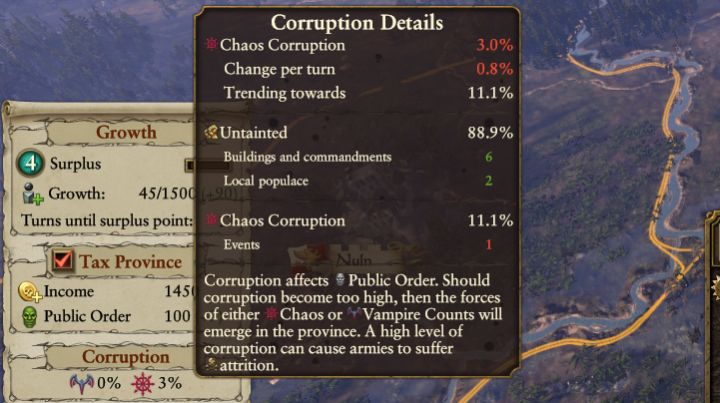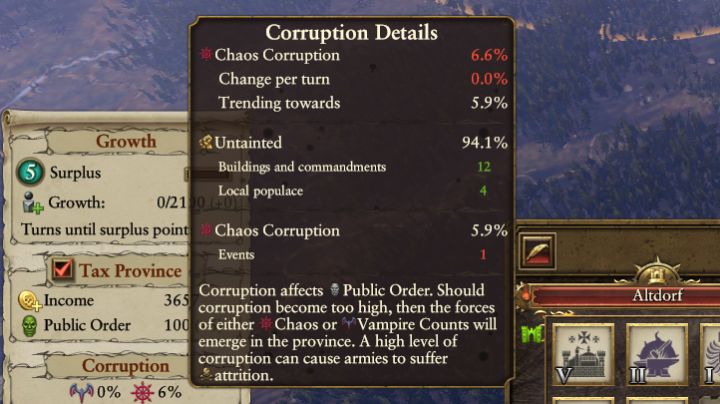Total War Warhammer: Controlling public order and corruption
Public order and corruption are two most important things that you must remember about when controlling and developing a province. Without proper planning and controlling what is happening inside of the province you can quickly cause the public order to decrease (or corruption to increase), which will in turn cause numerous revolts. In this chapter you will learn how to control both of those mechanisms.
Keeping public order under control

Public order represents the relations of the citizen living in the city to the one controlling it (in this case, you). If public order reaches -100 there will be a revolt. When that happens, a rebelling army will appear near the city the revolt happened. The army will grow in strength with each round, and sooner or later it will attack the city it spawned from. If you can't defend the city from this attack, the city will most likely be razed to the ground. The best course of action in such a situation is to get rid of the rebelling army as quickly as possible - or to prevent the rebellion from happening in the first place.
There's a number of things increasing the public order. Those are:
- Various buildings constructed in the province;
- Lords and Heroes located within the province;
- Lords' army stationed in a city within a province;
- Random events;
- Active commandment - you will need full control over the province to use it;
- Difficulty level - easy difficulty gives +2 to public order.
Things that lower the public order are as follows:
- An army moving around the province in the "raid" marching method;
- Increasing corruption (the only exception are the Vampires, which gain bonuses to public order when there's a high vampiric corruption, and negative ones when there's low);
- Taxes;
- Instability in the province (where there are fights and control over one of the cities shifts constantly);
- Seizing control over one of the cities (the negative factor will disappear after one turn).
- Random events;
- Hero actions;
- Difficulty level - hard difficulty level and higher decrease public order.
You should remember about public order especially when you are planning a rapid expansion. Freshly conquered terrains, especially those that were transferred from hands to hands frequently, and those with high corruption will have a huge penalty to public order. The penalty can easily reach -15 points (-19 with taxes), causing revolts in a matter of turns.
You shouldn't conquer too many settlements in a short amount of time. A better approach is to seize control over a few of them and then spend a number of turns stabilizing economy in them to prevent revolts. If you have a huge army that you won't be needing in the next few turns, you can send it inside of a settlement that you've just conquered. Presence of the army can give up to 20 points of additional public order. Additionally, turn off the taxes in those settlements - 4 additional points of public order will be more useful than some gold.
How does corruption work

First things first, you should understand how corruption works, as it's not explained properly by the game. The state of corruption can be checked by hovering your mouse over the terrain of a province, or over the percentage value shown next to every settlement (it won't be shown there during the first turns of the campaign). You can notice three values there: Untainted, Chaos Corruption and Vampiric Corruption.
However, it doesn't work in such a way, that having 10 points of corruption reduction ("Untainted"), 1 point of Chaos Corruption and 2 points of Vampiric Corruption will cause the terrain to be completely not corrupted. Those values indicate the percentage values of different types of influence over the terrain. If you, for instance, have 10 points of reduction and there's 1 point of chaos and 2 points of vampiric corruptions there, the terrain will by 70% untainted, 10% corrupted with chaos and 20% corrupted with vampirism. With 3 points of reduction and 1 point of both types of corruption, the terrain will be 60% untainted and 20% tainted with vampirism and chaos. You can't eliminate corruption from the land - you can only reduce it.
By hovering over the icon representing corruption (either on the settlement screen, or under the settlement's name on the world map) you will be able to see how the corruption will change. Three values are of interest to you, all of them located on the top of the corruption screen (which can also be seen on the above screenshot):
- Chaos / Vampiric corruption - the amount of corruption during this moment.
- Change per turn - if the value has a red color it means that the corruption is increasing, if the green it's decreasing. Those are reversed when playing as Vampire Counts and Warriors of Chaos - increase is indicated with green, and decrease with red color.
- Trending towards - it indicates the value that will be achieved during the next few turns. If the corruption is 5%, change per turn indicates that it will increase 1% for each turn, and the trending value indicates 15%, it means that during the 10 next turns the corruption will increase from 5% to 15%.
Decreasing and increasing corruption

You should also keep the corruption of the land you own in check. Corruption is spread by Vampire Counts (vampiric corruption) and the armies of Chaos (chaos corruption). In the case of the Vampire Counts the corruption is increased by heroes belonging to this faction, as well as a unique building that can be constructed in a city (it increases corruption in the province, as well as in any provinces adjacent to this one). When it comes to Chaos, corruption is spread by heroes, as well as by random events that happen from time to time.
Corruption can be decreased by:
- Constructing specific buildings in the cities - this decreases the corruption in the province it was constructed in;
- Researching some of the technologies;
- Recruiting and developing Heroes and / or Lords in a specific direction (by selecting abilities that influence corruption);
- By selecting an appropriate commandment in a province - only available when you have the whole province under your control.
If you can't prevent the corruption from increasing, the cities located on the corrupted land will suffer serious penalties to public order (up to -15 points!), your units will suffer attrition damage while traveling through those lands, and there can also be a rebellion. Similarly to the case when a low public order rebellion happens, in this case an army belonging to the faction which corruption increased to a high level will appear - either Vampire Counts' or a Chaos army.
Factions that must fight with both types of corruption are The Empire, Dwarves and Greenskins. In their cases the amount of corruption will increase separately, but the influence on the public order will be cumulative. Corruption can go up to 100% and can give you a huge penalty of -20 points to public order. Maintaining order in such a province will be extremely difficult.
It works different for the Vampire Counts. This faction spreads their own type of corruption (Vampiric Corruption), which influences their gameplay significantly. Their own corruption has an impact on the public order in their settlements. If it's high enough they receive a large bonus to the public order, but if it's low (or none), they will be given a huge penalty, going up to -15 points.
Vampiric Corruption influences their movement around the world as well. If the terrain is heavily corrupted (but with their own, as the chaos corruption has no impact on that) their units will be able to move around the province normally. If the corruption is low (or none), their units will suffer casualties due to attrition, losing a percentage of their troops with each turn. This is reversed for units of The Empire, Dwarves and Greenskins - highly corrupted terrains will hurt their units, whereas "clean" ones will have no impact.
This works similarly for the Warriors of Chaos, but with one difference - this faction has no settlements, which means that you won't have to worry about keeping public order in check, as there's nothing like this here. Their corruption affects all other factions (aside from Vampire Counts, who are immune to it) like the vampiric one does.
You are not permitted to copy any image, text or info from this page. This site is not associated with and/or endorsed by the developers and the publishers. All logos and images are copyrighted by their respective owners.
Copyright © 2000 - 2025 Webedia Polska SA for gamepressure.com, unofficial game guides, walkthroughs, secrets, game tips, maps & strategies for top games.
